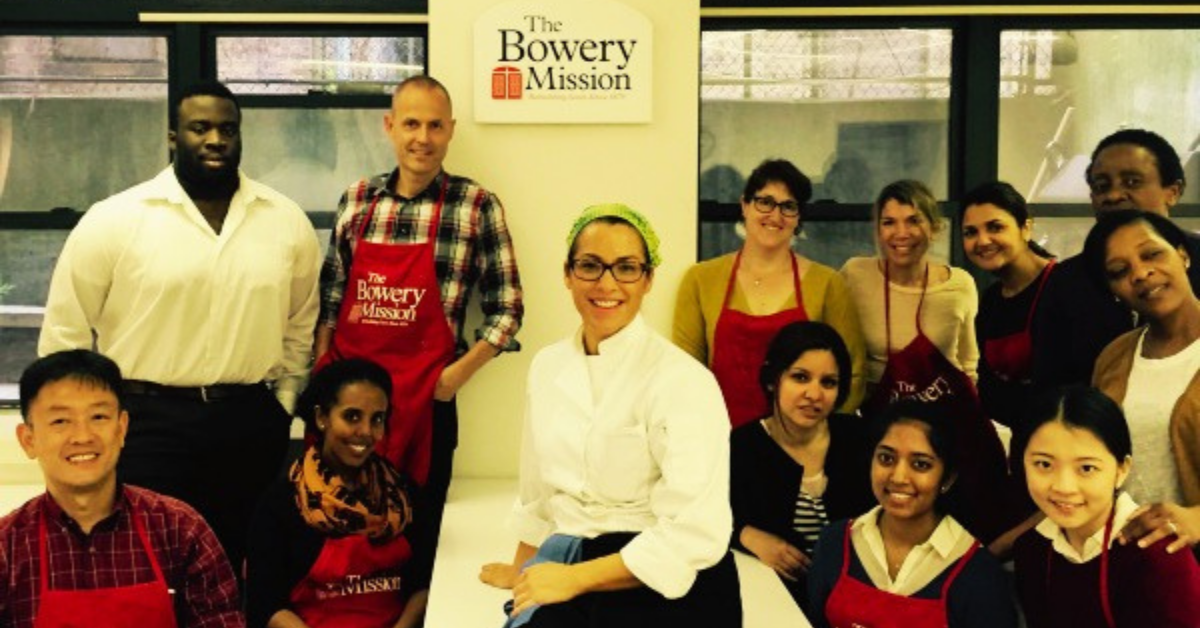Being homeless in New York City does not mean having to live on the streets or in subway tunnels thanks to organizations like The Bowery Mission, which offers recovery programs for men and women suffering from drug and alcohol addiction, mental health issues, poverty, and long bouts of unemployment.

Earlier this year, as part of my Didactic Program in Dietetics (DPD) at Lehman College and before I became a Dietetic Intern, I volunteered over 100 hours of my time at The Bowery Mission-Harlem Men’s Transitional Center, which is designed to move formerly homeless men into independent living through faith-based counseling, education, and career development training.
The center houses about 70 men in single-room units and provides them with clean clothing, showers, optical and medical services, and three hot meals a day. For my field work assignment, I was supervised by Gretchen Roth, the Food Services Manager (promoted to Senior Manager of Kitchen Operations on my last day), who oversees the center’s kitchen services and coordinates with The Bowery Mission’s larger location, the soup kitchen at 227 Bowery, to deliver food and supplies—all donated by the general public, restaurants, and food recovery organizations like City Harvest—to the Harlem location as needed.
Many of the Harlem Center residents were known as “chronically homeless,†meaning that they found themselves on the streets for long periods of time—sometimes decades—or in emergency rooms or crisis service centers over and over again without any improvements to their health and well-being. Having mental health issues or being institutionalized at some point also played a big part in their substance use or abuse.
According to a 2004 study, homeless persons and addicts stated that they sold their personal belongings, provided sexual favors, used rent money, or panhandled to purchase drugs and alcohol. Once they ran out of money, lost their jobs, or became addicted, they found themselves living on the streets. However, half of these respondents claimed to be less involved in drugs and alcohol after leaving recovery programs (such as The Bowery Mission’s) because of the personal attention, guidance, and intervention they received while in the program.
In a more recent article, homeless persons were positively affected in recovery programs because they offered constant social and personal reinforcements in addition to providing them with medical, mental health, and substance abuse support. Being in this kind of environment gave them a sense of normalcy and security, both necessary components of a successful recovery process. They appreciated the structure and routine this type of recovery program gave them.
Regardless of the reasons that brought these men to the Harlem Center, they are now better equipped and motivated to live independently once they graduate from the program.
Since my field work at the Harlem Center involved meeting specific criteria for my DPD program, I was fortunate enough to be involved in the inner workings of some of the center’s food service management components. For example:
- HACCP (Hazard Analysis and Critical Control Points)—This is a food service management system where an organization can address processes for everything from receiving deliveries from vendors to managing inventory to preparing, cooking, and distributing meals to consumers.
- Inventory control—The Harlem Center, like most Bowery Mission locations, relies on food donations which vary greatly each day and week, so receiving and inventorying is always a challenge.
- Purchasing—Since the Bowery Mission relies solely on donations, there is no food purchasing involved, but there is regular and ongoing correspondence between the Harlem Center and the main soup kitchen, and the organization will sometimes send a blast out on social media to request needed items and supplies. Unfortunately, there is no guarantee as to what items will be received or in what condition they will be once they arrive, e.g., sometimes donors don’t check their stock beforehand to see if they’re sending out moldy cheese and freezer-burned fish which have to be thrown away instead of being used to feed the residents.
- Food preparation—I assisted with and/or handled on my own the preparation of hot meals during lunch and dinner each week. Thankfully, from time to time, additional volunteers (like the kind souls from the United Nations in the photo above) would come to help with peeling and chopping massive amounts of potatoes, onions, and other veggies.
- Service—I assisted with and/or handled on my own working the lunch and dinner tray lines each week in the Center’s cafeteria. On any given day, we would feed about 70 residents. I really enjoyed getting to interact with these guys and learning about their journeys over the few months I was there.
- Menu—I assisted with and/or created on my own the dinner menus on the days I worked. The kitchen staff and residents would always give me feedback (usually positive) and I would make adjustments accordingly for the next meal.
- Cleaning—I monitored and participated in kitchen and cafeteria cleaning procedures like sanitizing cook and prep surfaces and dishwashing. I also helped create a daily cleaning schedule for the pantry/stockroom. Even though the center doesn’t serve food to the public, it still must adhere to strict food service guidelines since it does getting inspected by the NYC Department of Health and Mental Hygiene every so often just like a restaurant would.
- Supervision of personnel—On every occasion at the Center, I observed managers commend staff for a job well done or provide feedback about learning and teaching moments. Sometimes, a little “thank you” goes a long way in establishing staff morale, even if you’re volunteering your time and not a paid employee.
- Time sheets/payroll—A weekly schedule was always posted for kitchen and cafeteria duties. Most of the center’s kitchen staff are residents and unpaid. These duties are a part of the “on-the-job†training component of the recovery program.
- Miscellaneous—I helped create a fluid pantry/stockroom system for easier storage and retrieval of ingredients needed for the kitchen. Again, because the center receives donations only, there could be racks full of peanut butter or a complete shortage of pasta at any given time. Figuring out how to accommodate these situations without redoing the entire room layout was a little tricky, to say the least.
My experience at the Harlem Center was fantastic, but extremely humbling, as I’m sure all volunteer opportunities are. As a hyper-organized person by nature, I cannot imagine having to face the daily challenges of running a kitchen without knowing what food exists to be served. Add to that the patrons are previously homeless men who now reside in the facility and the responsibility to create a quality meal for them becomes overwhelming.
I have a lot of respect for the staff at the Harlem Center who can pull together a menu—for nearly 70 men, no less—like they are on the Food Network’s TV show Chopped* where they are forced to use whatever ingredients they are given at that moment. It was fascinating to watch the choreography between them and learn how to conduct that same dance on the days I worked on my own, even with so many years of food service already under my belt.
I also appreciated how everyone in that facility—from the front desk receptionist to the counselors—worked to create an interdependent, cohesive, and dynamic environment. Every moment spent at the center revolved around its mission to support and motivate the residents in making their new life possible.
I encourage you to volunteer your time, money, or goods at an organization that is close to your heart or click here if you’d like to donate to some of my faves.
*Fun fact: Gretchen Roth was recently a contestant on the Thanksgiving episode of Chopped. Click here to check it out!



Reblogged this on Dream Big, Dream Often and commented:
I have volunteered with a group similar to this Mission and it makes a huge difference in the lives’ of these men and women. Volunteer today and change someone’s future!
Thanks again, @dray0308, for the repost and comment!
It is my pleasure!